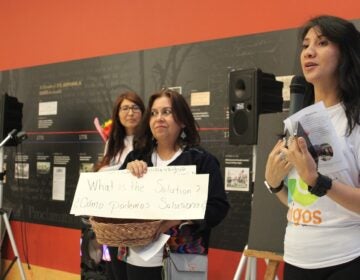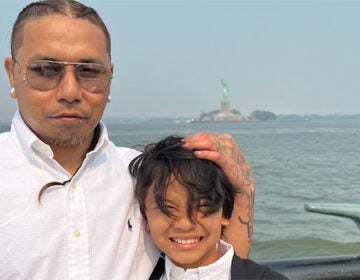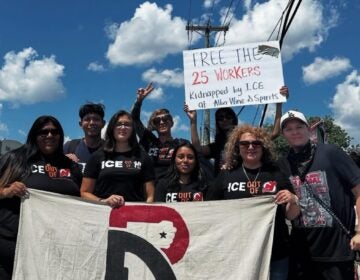Sereyrath ‘One’ Van emigrated to Philly in 1984 as his family fled genocide. Advocates are fighting his deportation
“When our families are separated in this way, it's basically permanent,” said one local advocate.
From Philly and the Pa. suburbs to South Jersey and Delaware, what would you like WHYY News to cover? Let us know!
Sereyrath Van, known to many as “One,” has no memories outside U.S. soil.
Now, the 44-year-old is fighting an order from Immigration Customs and Enforcement (ICE) that would deport him to Cambodia — a country Van has never visited.
Van had a check-in with ICE on Thursday. Advocacy organizations VietLead and Free Migration Project said he was detained within the first 10 minutes of the appointment. He is currently being held at the Moshannon Valley Processing Center, a privately-owned ICE detention center near Harrisburg.
At a rally outside of ICE’s Philadelphia office Thursday, roughly 100 people came out to support Van as part of the “All for One” movement. Speakers included state Senator Nikil Saval, City Councilmember Nicholas O’Rourke and Van’s family members.
Van’s deportation notice stems from a 2018 felony conviction for intent to sell cocaine and marijuana. Under the 1996 Illegal Immigration Reform and Immigration Responsibility Act, refugees and other immigrants, including green card holders, can be deported if convicted of a number of different crimes, including non-violent offenses.
David Bennion, executive director of Free Migration Project, a nonprofit that advocates for the right of all people to migrate, explained that the law has impacted “hundreds of thousands, maybe even millions of families since then.”
“Certain types of criminal convictions became almost a guarantee of deportation for hundreds of thousands of folks,” Bennion said. “And where there used to be more flexibility in the law before that, to take into consideration things like the amount of time that had elapsed since the offense or the conviction, family ties, rehabilitation, and all the things that in many ways, the criminal justice system itself, as terrible as it is, does or can take into account, those got written out of the law for immigration law.”
Van, who obtained his green card in 1988, currently has a pending U visa application. The U visa, for immigrants who are victims of crime, provides a residency permit and a potential pathway to citizenship as an immigrant who is the victim of a crime. With very few exceptions, ICE is not allowed to deport someone with a pending U visa application. But Bennion said none of those exceptions apply to Van.
Van came to Philadelphia with his parents and five siblings in 1984, when he was 4 years old. His family fled Cambodia during the Khmer Rouge genocide, which killed 2 million people. Van was born in Thailand and spent the first four years of his life at a refugee camp there, where his family relocated to escape the massacre.
Van’s family is part of the largest refugee resettlement in U.S. history. Following the Vietnam War, and covert U.S. military operations in the neighboring countries of Laos and Cambodia, more than 1 million Southeast Asian refugees were resettled in the U.S. between 1975 and 2008.
For many of those refugees, resettlement was not the end of a difficult journey. Van faced bullying and racism while growing up in Southwest Philadelphia, in a neighborhood where poverty and crime presented daily challenges. He entered the juvenile justice system as a teen.
After his 2018 conviction, Van was incarcerated in state prison. During that time, ICE began his deportation proceedings, revoked his green card and issued his final order of removal.
Van was released in October. ICE then detained him for close to 90 days at Moshannon Valley Detention Center and released him in January before the 90-day detention period expired.
On July 9, Van attended an unexpected ICE check-in and was given a 14-day notice of final removal.
According to Van, and VietLead and Free Migration Project advocates, the immigration court judge in Van’s case originally designated Thailand as the primary country of removal, with Cambodia listed as the alternative. The removal order that Van received on July 9 showed Thailand as being whited out, with Cambodia the only country for removal listed.
Since the U.S. and Cambodia signed a bilateral repatriation agreement in 2002, more than 1,000 people have been deported to the country — including many who, like Van, grew up in the U.S. and weren’t born in Cambodia.
Van said he takes “full responsibility” for his actions which led to his conviction, but views a deportation order to Cambodia as “triple punishment.”
“Yes, my drug dealing did bring harm to the community,” he said, pointing to those dealing with addiction and their families. “It caused suffering, and it might have contributed to the crime in the area — that I’ll always take responsibility for. But, like I said, send me to Cambodia — that’s triple punishment. I already did my punishment, my time. Getting deported is another punishment. But sending me to a country I never even been to, or born at, that’s a third punishment. So how many punishments am I supposed to get?”
The Philadelphia ICE office did not respond to WHYY News’ request for comment.
‘We feel like we’re still at war’
Claire Nguyen, community defense and communications senior coordinator at VietLead, said Van is not alone. Many Southeast Asian refugees have entered the criminal justice system and are now at risk of deportation.
“We know of community members in other states who have been detained by ICE around the same time that One became a higher risk for deportation, and there is this feeling that our community is being used as political pawns right now during this election year,” they said.
VietLead estimates around 100 Southeast Asian refugee residents in Philly have either been deported or are facing deportation. Nguyen said that nationally, 16,000 Southeast Asian refugees have deportation orders, the majority of which “are a result of old criminal convictions because of their experiences with the school-to-prison pipeline.”
“During the time of refugee resettlement, the U.S. was also waging the war on drugs and the war on crime, where poor, young Black and brown people were being swept into prison with what’s commonly known as the school-to-prison pipeline, and our community was pushed into that too,” they said. “Folks were resettled in poor communities where they experienced racial violence, bullying, poverty, and these conditions made it really easy for refugee youth like One, who grew up as a refugee kid in Philadelphia, to be pushed into the school-to-prison pipeline.”
VietLead helped write the Southeast Asian Deportation Relief Act, which puts forth a series of measures that make it easier for refugees to renew work authorization and challenge deportation orders.
“Deportation in our community … it basically perpetuates cycles of violence in our community, because we were displaced by war, by genocide, at the hands of U.S. military intervention there as well, and we were resettled here into terrible conditions, and now the government is trying to deport our people back to the places that they displaced us from,” she said.
U.S. Rep. Mary Gay Scanlon is one of the co-sponsors of the Southeast Asian Deportation Relief Act. Van lives in Scanlon’s district, and he and other advocates have reached out to her office and the offices of U.S. Sen. John Fetterman and U.S. Sen. Bob Casey to push for public support. Nguyen said that, so far, they have not been able to garner public support from the elected officials.
“When it comes to One’s situation right now, we are really disappointed by how little they’ve been doing to really amplify his case and really, you know, do their job to serve their constituents, serve our community,” she said. “That’s why we elect them.”
Both Scanlon’s and Casey’s offices declined to comment on Van’s case, citing policy on confidentiality in constituent services.
“The Congresswoman and her team treat each request for constituent service as urgent and important and will continue to do so in order to ensure the best constituent service possible is provided,” a representative for Scanlon’s office said in an email.
Fetterman’s office did not respond to a request for comment as of publication.
Nguyen said that every person deported has a ripple effect on the local community — something she’s seen and been impacted by firsthand as a Vietnamese American. One’s deportation would affect his family, his friends and the community as a whole that he is now working to serve.
“When our families are separated in this way, it’s basically permanent, and it’s repeating a cycle of family displacement that we already experienced as a community when we had our refugee journeys to the United States and to other places around the world,” she said. “It just does not allow our community to heal from the trauma of war, because we feel like we’re still at war.”

‘We need to change that narrative’
Before his detention on Thursday, Van was working as an auto mechanic at his older brother’s business. He said he’s been reconnecting with family members and friends since his incarceration.
Van lost his mother in December 2020 when he was still in prison. His dog, Max, a “big Pomeranian,” as Van described him, also died before Van was released in 2023. Those losses were difficult, Van said, but he is looking forward to being settled and to giving back to the community if he is granted a stay of removal.
“The only people [who] might think I’m a bad person is ICE and law enforcement because they see, oh … he sold drugs,” Van said. “But you meet anybody else that’s not the law, or whoever you want to say, they will tell you, I’m probably the best person they ever came across, a very helpful person.”
In the midst of uncertainty, Van said he is trying to stay “optimistic.”
“I’ma keep being me,” he said. “And after all I went through, I’m still me. I never change, no matter what situation I’ve been put through, I never change. I’m still the one that you could count on, you could love and would love you back, you know. And don’t want nothing bad.”
Van said he and other immigrants are more than their immigration status.
“They didn’t look at me, whoever I made a great relationship with, that loves me to death, they didn’t look at me as I’m here as a permanent green card holder, as then I made a mistake, let’s deport them,” he said. “Only the government looks at you like that, and we need to change that narrative, that image or that storyline, you know, because that storyline is not fair. We’re all humans. We make mistakes. We make poor choices.”

Get daily updates from WHYY News!
WHYY is your source for fact-based, in-depth journalism and information. As a nonprofit organization, we rely on financial support from readers like you. Please give today.






